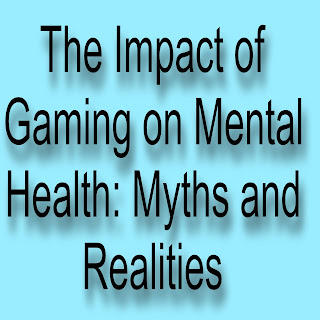The Impact of Gaming on Mental Health: Myths and Realities
The Impact of Gaming on Mental Health: Myths and Realities
The impact of gaming on mental health is a topic that has been widely discussed and debated in recent years. While some people believe that gaming can have a negative impact on mental health, others argue that gaming can actually be beneficial. In this response, I will explore some of the myths and realities surrounding the impact of gaming on mental health.
Myth: Gaming is addictive and can lead to mental health problems.
Reality: While some people may become addicted to gaming, the vast majority of gamers do not experience addiction or any negative impact on their mental health. According to a study published in the Journal of Cyberpsychology, Behavior, and Social Networking, only a small percentage of gamers (between 1% and 10%) experience addiction or problematic gaming behavior. Additionally, the World Health Organization (WHO) has recognized gaming disorder as a mental health condition, but only when it is severe enough to cause significant impairment in personal, family, social, educational, occupational or other important areas of functioning.
Myth: Gaming leads to social isolation and loneliness.
Reality: While gaming can be a solitary activity, it can also be a highly social one. Many gamers connect with others through online communities and gaming events, which can actually help to reduce feelings of isolation and loneliness. A study published in the journal Computers in Human Behavior found that gamers who played online multiplayer games reported higher levels of social support and lower levels of loneliness than non-gamers.
Myth: Gaming leads to aggression and violence.
Reality: While some studies have found a correlation between gaming and aggression, the causal relationship between the two is still unclear. A meta-analysis of 24 studies published in the journal Personality and Social Psychology Review found that while there is a small positive correlation between violent video game use and aggression, it is important to note that correlation does not imply causation. Additionally, many studies have found that gaming can actually have a positive impact on mental health by providing stress relief and promoting relaxation.
Myth: Gaming is a waste of time and has no real-world benefits.
Reality: Gaming can actually have many real-world benefits, such as improving cognitive function, enhancing problem-solving skills, and promoting creativity. According to a study published in the journal Nature, playing action video games can improve visual attention and spatial cognition. Additionally, a study published in the Journal of Educational Psychology found that playing video games can enhance problem-solving skills and creativity.
Myth: Gaming only appeals to young people and is a waste of time for adults.
Reality: While it is true that many young people are drawn to gaming, there is a growing number of adults who also enjoy gaming as a hobby. In fact, according to the Entertainment Software Association, the average age of a gamer in the United States is 35 years old, and 45% of gamers are women. Additionally, many adults find that gaming can be a fun and engaging way to relieve stress and unwind after a long day at work.
Myth: Gaming addiction is not a serious problem and can be easily overcome.
Reality: Gaming addiction can be a serious problem for some individuals, and overcoming it may require professional help. According to the American Psychiatric Association, symptoms of gaming disorder may include impaired control over gaming, increased priority given to gaming over other activities, and continuation or escalation of gaming despite negative consequences. If you or someone you know is experiencing these symptoms, it may be helpful to seek the guidance of a mental health professional.
Myth: All types of gaming have the same impact on mental health.
Reality: The impact of gaming on mental health can vary depending on the type of game being played. For example, some studies have found that playing games with violent or aggressive themes may have a more negative impact on mental health than playing games with non-violent themes. Similarly, some games may be more likely to promote addiction or problematic gaming behavior than others. It is important to be mindful of the content and frequency of gaming, and to choose games that align with personal values and interests.
Overall, it is clear that the impact of gaming on mental health is a complex and multifaceted issue. While there are certainly some potential risks associated with gaming, there are also many potential benefits. As with any activity, it is important to approach gaming with moderation and balance, and to be mindful of any potential negative effects on mental health.
In conclusion, while some myths about the impact of gaming on mental health do contain some truth, it is important to note that gaming can also have many positive effects. As with any activity, it is important to practice moderation and balance in order to avoid any negative impact on mental health.




Comments
Post a Comment